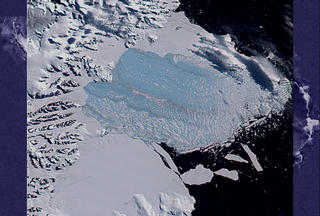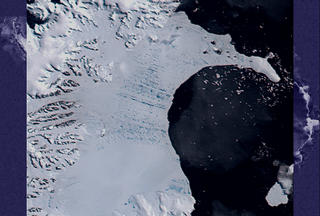 - March 2002 - The Larsen B Ice Shelf in Antarctica collapsed in the largest ice shelf collapse since satellite imagery began. The collapsed area was 3,250 square kilometers, approximately the size of Rhode Island, and averaged more than 200 meters thick (the thickness of a 50 story building).
- March 2002 - The Larsen B Ice Shelf in Antarctica collapsed in the largest ice shelf collapse since satellite imagery began. The collapsed area was 3,250 square kilometers, approximately the size of Rhode Island, and averaged more than 200 meters thick (the thickness of a 50 story building).Antarctica has been warming by about 0.5 degrees Celsius per decade for the last 60-70 years. This is much faster than the globe as a whole. Both the northern and southern polar regions are warming faster than global temperatures overall, which is consistent withwhat would be expected with climate being driven by greenhouse gas forcings (meaning that additional CO2 and other gases are the major cause of climate change rather than solar output or other causes).
Since the ice shelf was floating, this collapse will have no effect on sea levels (just as an ice cube melting in a glass does not change the water level.) However, as sea ice vanishes, it exposes the darker waters below to sunlight. Ice reflects the sun's rays back into space; sea water mostly absorbs them. This causes what is called an amplifying feedback loop. The more ice that melts, the warmer the sea gets, which causes more ice to melt, etc.--speeding global warming.
=================
This is one in the series of "Decade in Review" posts on this blog that began in January 2010. These posts present climate-change-related events that occurred during the 00's, the warmest decade in recorded history.





No comments:
Post a Comment